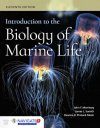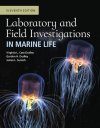About this book
Written in a conversational tone, the Eleventh Edition of Introduction to the Biology of Marine Life, continues to provide students with a clear and engaging introduction into the exciting world of marine organisms and the extraordinary environments in which they live. Assuming no prior knowledge to marine biology, the text uses selected groups of marine organisms to develop an understanding of biological principles and processes that are basic to all forms of life in the sea, including phytoplankton, marine plants, microbial heterotrophs and invertebrates, fishes and reptiles, as well as seabirds and marine mammals. Building on the biological basics of these groups, the text progresses to discuss the taxonomy, evolution, ecology, behavior, and physiology. Additional topics include the ocean as a habitat, patterns of associations, estuaries, coastal seas, coral reefs, the open sea, the deep sea floor, and harvesting living marine resources.
Contents
Chapter 1 The Ocean as a Habitat
Chapter 2 Patterns of Associations
Chapter 3 Phytoplankton
Chapter 4 Marine Plants
Chapter 5 Microbial Heterotrophs and Invertebrates
Chapter 6 Marine Vertebrates I: Fishes and Reptiles
Chapter 7 Marine Vertebrates II: Seabirds and Marine Mammals
Chapter 8 Estuaries
Chapter 9 Coastal Seas
Chapter 10 Coral Reefs
Chapter 11 The Open Sea
Chapter 12 The Deep Sea Floor
Chapter 13 Harvesting Living Marine Resources
Chapter 14 The Ocean in Motion
Chapter 15 The Polar Seas
Customer Reviews
Biography
John F. Morrissey is Professor of marine biology at Sweet Briar College, where he has received the 2010 Connie Burwell White Excellence in Teaching Award. He is on the Board of Directors and Executive Committee of the American Elasmobranch Society, the world's largest scientific society of professional ichthyologists who specialize in the biology of sharks, skates, and rays. His research interests include deep-sea sharks of Jamaica, natural history of chain catsharks (Scyliorhinus rotifer), the association between yellow stingrays (Urobatis jamaicensis) and cattle egrets (Bubulcus ibis), behavioral ecology of juvenile lemon sharks (Negaprion brevirostris) inferred via ultrasonic telemetry, and molecular systematics of elasmobranches.
James L. Sumich, Ph.D., is an instructor of marine biology and zoology at Grossmont Community College in El Cajon, California. Professor Sumich has been heavily involved with curriculum development at Grossmont, including the creation of a textbook and laboratory manual for marine biology, and the introduction of computer-enhanced instruction techniques for biology laboratories. He recently co-authored an advanced textbook on the biology of marine mammals. His current research interests include studies of the energetics of fasting, migration, and lactation in gray whales.
Deanna R. Pinkard-Meier is an instructor of general, marine and organismal biology at Grossmont College and several other colleges in San Diego, including the University of San Diego. Professor Meier has developed unique teaching methods including the use of technology and interactive in-class learning. She has worked in the field of marine science along both coasts of the United States and Mexico for several universities, the National Oceanographic and Atmospheric Administration, and she occasionally consults as an environmental biologist. Some of her research projects have included the development and use of technology to survey threatened or endangered marine organisms, identification of the oceanographic influences that affect early life stages of marine organisms, and the reproductive biology and recruitment dynamics of tropical marine fish. She can often be found leading her students on field trips in the intertidal, fishing with her two sons or checking the surf at her local breaks.




































